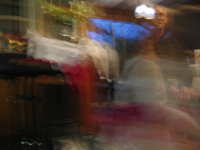From the Kitchen #23
 What you are now reading is the world première of ‘From the Kitchen #23’. Last week you read the world première of #22.
What you are now reading is the world première of ‘From the Kitchen #23’. Last week you read the world première of #22.
Last night I was at a concert of the Australian Chamber Orchestra at which Richard Tognetti played the world première performance of ‘Vox amoris: Fantasy for violin and orchestra’ by Pēteris Vasks. It was billed as the world première, but it wasn’t. It had been performed by the ACO earlier in the month in Sydney, Brisbane and Melbourne.
The other day I was sitting in a café and a man sitting at an outside table was playing guitar. I went out to listen. He was improvising. I was witnessing a world première. I felt special.
I am intrigued by the importance to people of world firsts and world’s best, fastest, highest, deepest … We seem to have a need to mark and celebrate achievement. The first performance of a piece of music or a new play, or the first exhibition of a new work of art are like the birth of a child is to the parents. I know that I feel precious about each piece I produce and send out into the world. This can also come with a sense of relief for me, especially after a long gestation and, perhaps, a difficult birth.
A few weeks ago I attended the world première of a short play I wrote – Be Mused, a monologue. A play is perhaps more like a child than, say, a short story, poem or essay. There are opportunities to observe it, correct it, modify its behaviour; often with wanted or unwanted advice from other ‘parents’. As the play is revised, even rewritten, does the next performance count as a world première? Does anyone care?
Whether I enjoy a concert or play or film depends as much on how I’m feeling at the time as on what is being played out on the stage or screen. I’ve come out of a cinema more than once, wondering why I bothered and then later watched the same film on TV or DVD and enjoyed it thoroughly. The première viewing was a fizzer.
The ACO concert last night also featured ‘the girl with the golden flute’, Sharon Bezaly. Her playing was technically brilliant, but the two works in which she played solo did not grab me emotionally. I was also distracted by the constant flashing of her shiny, gold-plated flute and her mannerisms – her physical presence as the performer overwhelmed the music itself. It’s possible that I was distracted because the music didn’t speak to me. Richard Tognetti also has a commanding presence when he plays, but his physical calisthenics during his solo performance in the violin fantasy went almost unnoticed, as I felt myself swallowed up by the beautiful music.
There is something about a performance getting in its own way. It’s similar to music in films and documentaries often detracting from what we should be paying attention to, instead of it being all but an inaudible part of the whole because it supports the visuals and the dialogue or commentary. Overbearing music in film is akin to the glaze on a painting being so obvious that you can’t see the picture clearly.
There is also a parallel in writing. The language can be overly florid or the use of words too clever, so that the message gets lost. Really good writers can leave me breathless with a descriptive passage because I’m not immediately aware of the words used, until later. The words stimulate my mind and create powerful images or they evoke an emotional response, neither of which is an intellectual exercise. Using words that seem out of place or forced, detracts from the reading experience.
Some example may be useful.
Recently, at the end of the film Julie and Julia, I watched the credits. When the music credits rolled up, I was surprised: I didn’t remember hearing any of the pieces although I know most of them. I’m sure the music played a part in my enjoyment of the film, the more so because it stayed out of the way.
In his contribution to the Reader (Emerging Writers’ Festival, 2009), ‘Lonán Greenish Goes Forth’, Kirk Marshall writes:
He was brusquing down flowered lanes with his eyes clenched against the thorns of the sun’s gorse, warding off the cutthroat glare …
On the other hand, this beautiful snippet from Bruce Pascoe’s Bloke (Viking, 2009):
… a lazy estuary where jade water whispered across sandbanks rippled like the roof of a baby’s mouth …
I guess that often, when I write, I look for ways of expressing something in a way that no-one else had done it; I’m trying to create a world first.
© 2009 Daan Spijer
[to receive an email each time a new piece is posted, email me: <daan dot spijer at gmail dot com>]
 CLICK HERE to download a formatted PDF of the above post
CLICK HERE to download a formatted PDF of the above post
 See more of Daan Spijer’s writing and his photos at Seventh House Communications
See more of Daan Spijer’s writing and his photos at Seventh House Communications